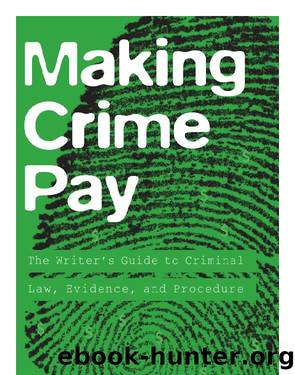Making Crime Pay by Andrea Campbell

Author:Andrea Campbell
Language: eng
Format: epub
Publisher: Allworth
Published: 2012-01-15T00:00:00+00:00
Characterizing a Police Officer
Law-enforcement officers, no matter what division or level, must uphold and follow the law in order to obtain proof of guilt and the satisfactory resultâa judgment against the perpetrator. Any egregious technicalities against the suspectâs constitutional rights give rise to many problems, delays, and even mistrials. Any screw-ups can result in a case dismissal. The drama of dealing with these problems can add verisimilitude and depth to your stories. Just realize that not every mistake leads to a criminalâs freedom, and not every encounter can end with a major shootout or body count.
It may help you to portray police officers correctly if you remember that they are, first of all, human beings. Everyday civilians view cops with a skewed perception. He is âthe guy who gave me a ticket,â or heâs someone to complain to about an injustice or the problems with society, as if itâs in a copâs power to do something about it. Itâs a status that calls forth certain clichéd images the media helps to perpetuate through news, books, and movies. The Corrupt Cop and the Stupid Cop stereotypes are usually the staples of any private-eye story or anything involving a conspiracy theme. People in general rely so instinctively on these character types and preconceptions that most of the time they donât recognize their overgeneralizations. It would behoove you, then, to take some effort to give them, the cops, life: Mention personal problems, or talk about how they fight disillusionment. Learn to describe the world they live in with more specificity. Much of their time is spent with other fellow officers and their families. Think about how spending the major portion of their day and night with the dregs of society affects their outlook and demeanor. And just as doctors have their Latin prescriptions, and scientists have their elements, so do police officers have their codes and calls. Using their argot, they are able to communicate with each other in a way that is not clear to the common people around them. And you can use that argot to add dimension to your police characters.
Patrol Officers
The patrol division is the backbone of the agency. Regardless of where police officers come from or end up, they will experience some of what the patrol division offers. As the first assignment, a rookie officer is usually placed with a more senior member of the division, who could be referred to as a âfield training officerâ or, more colloquially, âcoach.â The trend in law-enforcement training is toward the use of field-training programs; however, a substantial portion relies on on-the-job training combined with additional classroom instruction.
A new officer is assigned to a particular community in accordance with the personnel needs of the patrol bureau and with the philosophy of the chief administrator. One chief may feel, perhaps, that the new officer should be directly challenged and evaluated, and so assigns the rookie to a high-crime area to accelerate the acquiring of experience. Others opt for a slower approach, putting officers in a less hostile environment before immersing them in a highly charged region.
Download
This site does not store any files on its server. We only index and link to content provided by other sites. Please contact the content providers to delete copyright contents if any and email us, we'll remove relevant links or contents immediately.
| Authorship | Bibliographies & Indexes |
| Book Industry |
Autoboyography by Christina Lauren(4692)
Asking the Right Questions: A Guide to Critical Thinking by M. Neil Browne & Stuart M. Keeley(4623)
Dialogue by Robert McKee(3609)
Eat That Frog! by Brian Tracy(3547)
Sticky Fingers by Joe Hagan(3466)
Journeys Out of the Body by Robert Monroe(3014)
Elements of Style 2017 by Richard De A'Morelli(2952)
Annapurna by Maurice Herzog(2858)
Schaum's Quick Guide to Writing Great Short Stories by Margaret Lucke(2819)
Full Circle by Michael Palin(2792)
The Diviners by Libba Bray(2456)
The Art of Dramatic Writing: Its Basis in the Creative Interpretation of Human Motives by Egri Lajos(2425)
The Mental Game of Writing: How to Overcome Obstacles, Stay Creative and Productive, and Free Your Mind for Success by James Scott Bell(2404)
Why I Write by George Orwell(2376)
Atlas Obscura by Joshua Foer(2359)
In Patagonia by Bruce Chatwin(2287)
The Fight by Norman Mailer(2168)
The Elements of Style by William Strunk and E. B. White(2081)
Venice by Jan Morris(2062)
